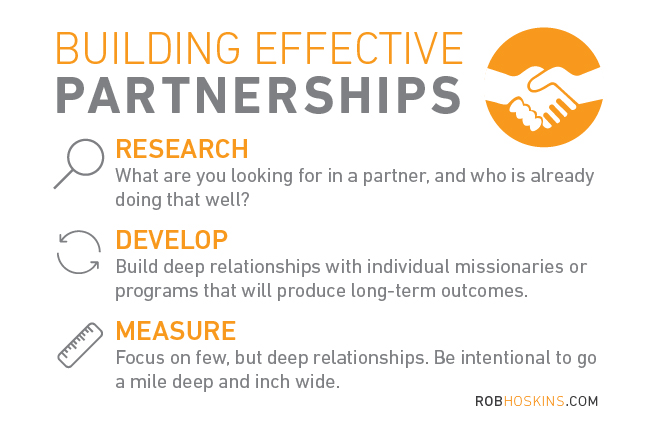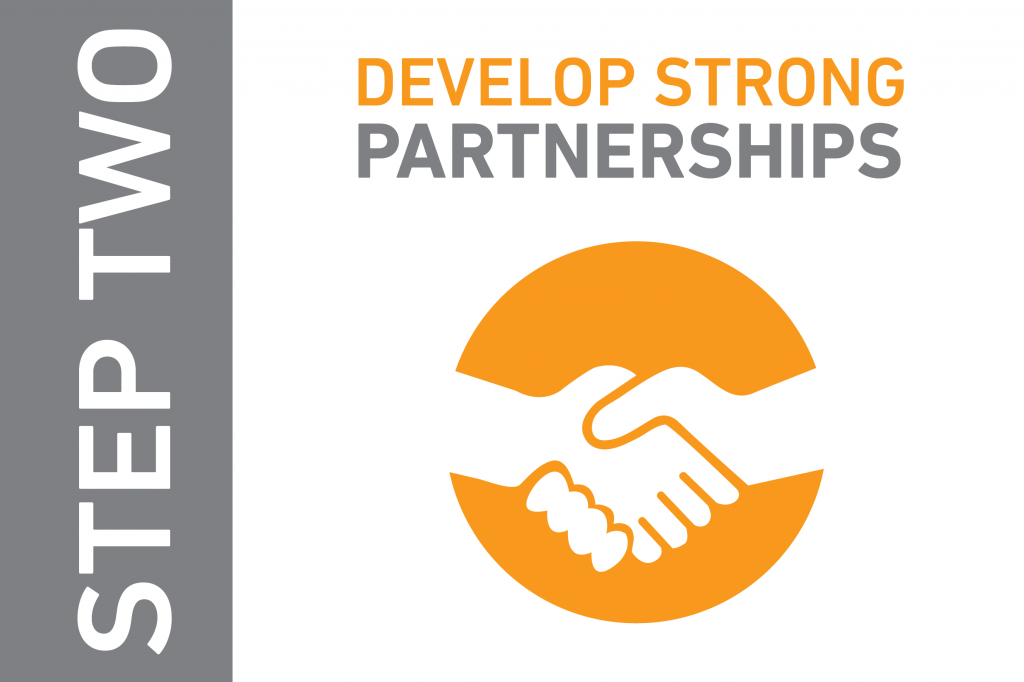Now that you have identified your purpose it’s time to be proactive about partnering with the right people. Being proactive allows you to:
- Choose “best in class” ministries/people to work with
- Choose partners with similar core values and beliefs
- Establish measurable outcomes together
Proactivity in establishing your strategy and planning your partnerships also prevents reactivity.
Quite often someone in a church goes on a short-term mission trip and comes back seeing needs they want to address. They take to the Internet, research and create their own 501(c)3 organization or charity, then ask their pastor and congregation to support it. Many pastors I counsel express their feelings of obligation to support that individual’s passion, but frustration that they (a) can’t support everyone’s personal passions in their local body and (b) it might not be in line with the core values of the body of their church.
When you have a firm purpose already stated as the mission, vision and core values of your church, you are fully prepared in advance to instantly be able to respond to these situations with an educated and informed answer.
Now let’s look at what it is going to take to get you there:
- Research. Before launching into a new venture, it’s a good idea to research what you have to work with and document it for future steps in the process. We call this an asset map. Identify all of the assets that you have in your local body; not just your financial assets but your people, your human resource, their skills, abilities and passions. Don’t be afraid to identify what is important to you and specialize.
Let’s demystify what research is, it’s merely a discovery of the truth.
Now do some external research outside of your body to identify, “Who is God already using in a particular region?” and “How can we work together?” Dig around, ask around, and find out who is “best in class”—already doing what you desire to do and doing it well.
Example: Who is the “best in class” in the area of holistically caring for children trapped in poverty and also holds some of our close missional values? Compassion International has a historic record of doing an amazing job with true outcomes in the area of child sponsorship to alleviate poverty, and they are also committed to building incredible spiritual growth in the lives of the children who go through their program.
- Figure out a way to partner with the “best in class.” Begin to build deep intrinsic relationships with individual missionaries or individual programs that you can have a long-term relationship with in order to achieve long-term sustainable outcomes.
A few questions to consider when laying the groundwork for a partnership:
- What are the agreed upon time frames for your partnership?
- What are the outcomes that you’d like to accomplish together?
- How will progress be measured and evaluated?
Measure your results. There are two basic approaches to how you will measure effectiveness in missions that are in tension with each other.
There is the “Inch Deep and a Mile Wide” scenario typified by:
- Many partners with many programs in many places
- Surface relationships
- Low accountability
- Generally measured by outputs (what you do, not what is accomplished)
- Difficult to communicate
In many cases, churches are maintaining their historical “Inch Deep and a Mile Wide” strategy. Some churches have inherited decades worth practices of supporting multiple missionaries from 20th century missions programs. The result: a large church measuring their missional effectiveness by saying, “We support a hundred missionaries in 50 different countries.” That was attractive and effective for the last generation, but what about today?
If you’re just supporting a lot of people with a little amount, it becomes very hard to have a true, strong relationship with them as opposed to investing at a deeper level over a longer period of time.
We strive for a different approach—the “Mile Deep and Inch Wide” strategy epitomized by:
- Strategic partners with strategic programs in strategic places
- Deep relationships
- High accountability
- Able to be measured by outcomes (what is accomplished)
- Easy to communicate
It takes more time and intentionality to go deep than to go wide, but it is worth it.
To be truly effective in this generation requires building programs that are focused, deep, and strategic in your area of purpose.
Before making strategic plans on how to move forward in partnering with people, you need to negotiate with your past and figure out how to be fair to those missionaries who you’ve been supporting that may or may not fall under the “Mile Wide” strategy.
Taking the time to flesh out this step of the process will empower you to proactively move forward with a solid plan to design and achieve an effective approach to 21st century missions.
Next, Popularize the message.
You should also read:
- Missions audit: 5 steps to evaluate the strength of your strategic vision
- 7 missions trends you need to know about RIGHT NOW!
- How to transition through the change well
- Tips to build a leadership dream team
- Outcome based ministry and why you need to do it





